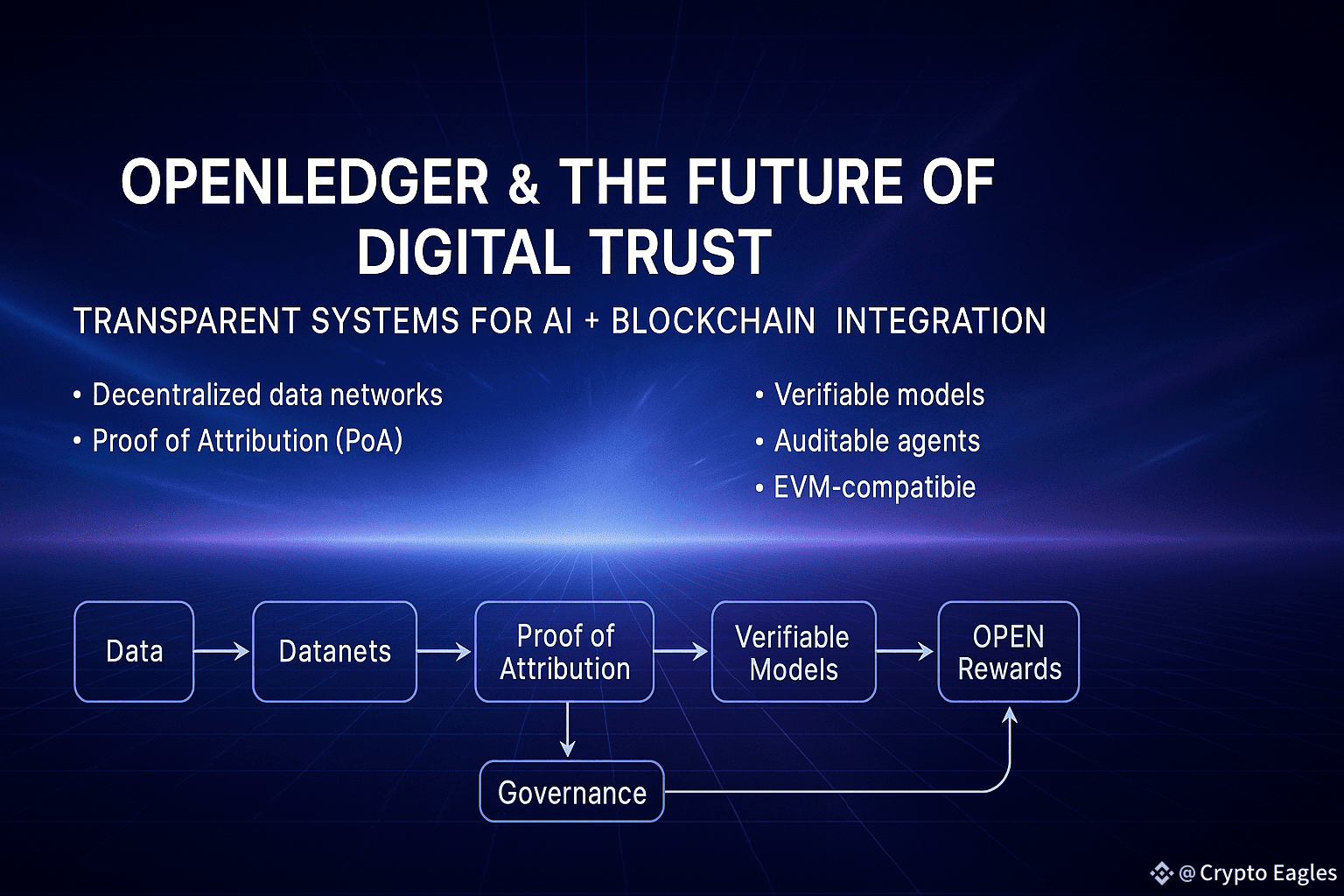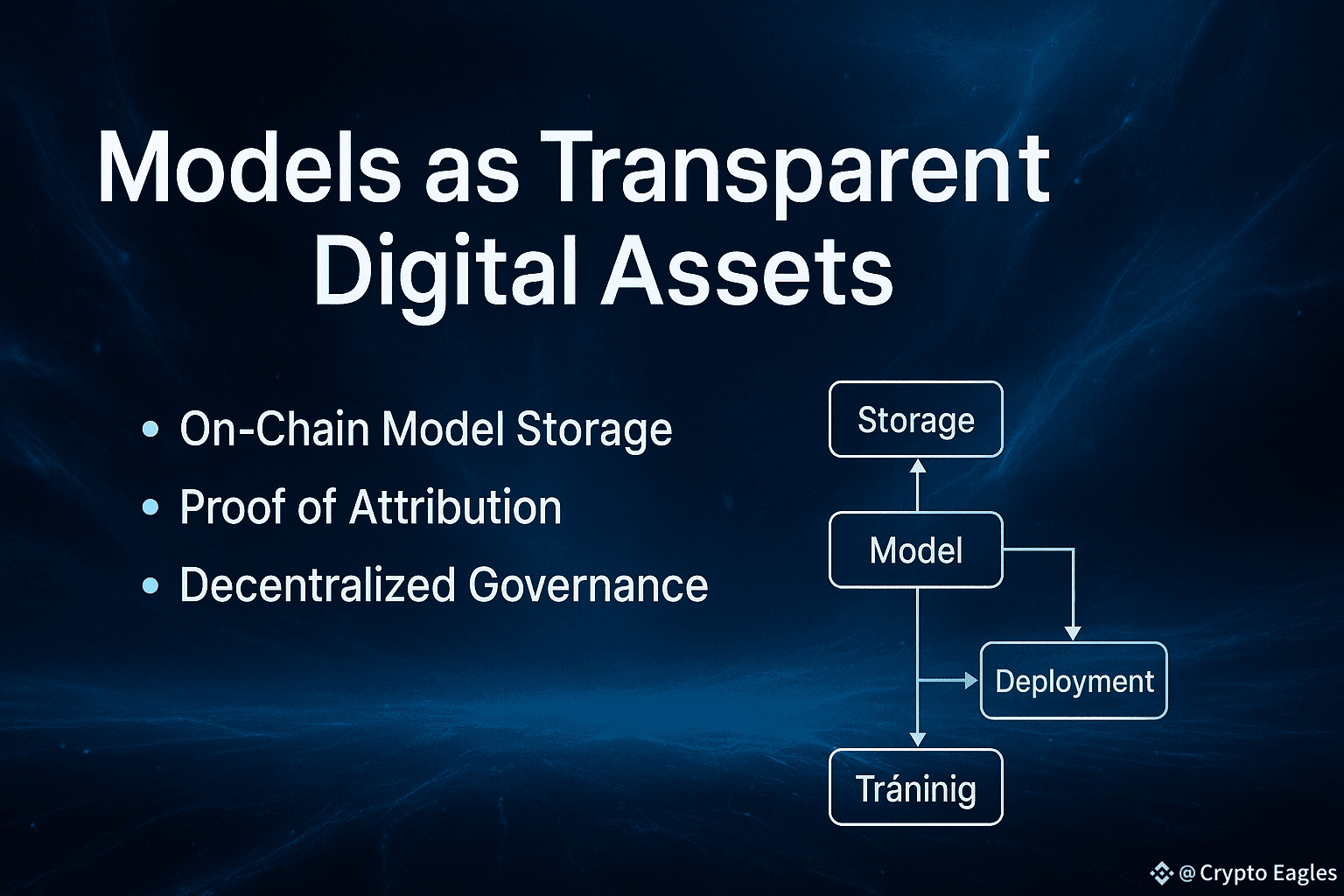Every era of technology is defined by the infrastructure that allows people to trust it. The internet created trust through open protocols and transparency of access. Blockchains created trust by making transactions verifiable and decentralized. Artificial intelligence, however, still struggles with trust. Most AI systems are opaque, their decision-making hidden in black-box models, their data sources unclear, and their incentives skewed. Without trust, AI adoption will always face resistance from enterprises, regulators, and individuals alike.
OpenLedger approaches this challenge directly by positioning itself as the infrastructure of digital trust for AI. By combining blockchain transparency with attribution mechanisms for data, models, and agents, it provides receipts for every action. This transforms AI from something people must blindly accept into something they can verify, audit, and govern. Seen from this perspective, OpenLedger is not just about monetizing AI—it is about rebuilding trust in the digital economy.
The Problem of Opaque AI
Artificial intelligence today is powerful but largely unaccountable. When a model generates a response, users have no way of knowing what data influenced the outcome. When an autonomous agent takes an action, businesses cannot trace its reasoning. Even when datasets are licensed, contributors rarely see recognition or payment. This opacity creates several issues.
For enterprises, it introduces liability. Deploying AI without explainability can lead to regulatory fines or reputational damage. For regulators, it complicates oversight because systems cannot be audited effectively. For individuals and communities, it breeds mistrust, as their contributions to the AI economy disappear without attribution. The result is an AI ecosystem that advances quickly in capability but slowly in adoption, because stakeholders do not trust it enough to integrate deeply

OpenLedger’s Vision of Verifiable AI
OpenLedger addresses this by building trust into the fabric of AI workflows. Every dataset, model, and agent interaction is logged on-chain using Proof of Attribution. This provides verifiable receipts for how outputs were generated and who contributed to them. Instead of a black box, AI becomes a glass box where influence can be traced and accountability enforced.
This vision aligns with a broader cultural demand for transparency in digital systems. People do not just want services to work—they want to know why and how they work. OpenLedger allows AI to meet that demand by making every step auditable, from data contribution to model fine-tuning to agent deployment.
Datanets as Trusted Knowledge Repositories
At the center of this trust framework are Datanets. More than just data pools, they are collaborative repositories curated with provenance and governance. Every data submission is tracked with metadata, ensuring contributors remain visible. Communities can set standards for quality, licensing, and usage.
For enterprises, Datanets reduce risk. Instead of scraping questionable datasets, they can source trusted data with clear licensing. For regulators, Datanets provide a transparent structure to evaluate how data is collected and used. For communities, they provide recognition and rewards, ensuring that knowledge is not extracted unfairly. By turning datasets into trusted knowledge repositories, OpenLedger removes one of the biggest barriers to AI adoption.
Proof of Attribution as the Engine of Accountability
The core mechanism powering trust on OpenLedger is Proof of Attribution. Unlike traditional blockchains that focus on consensus for transactions, PoA focuses on consensus for contributions. It records the influence of datasets, models, and agents on every output, then routes rewards accordingly.
This does two critical things. First, it ensures fair compensation for contributors, creating an economy where invisible labor is finally recognized. Second, it provides enterprises and regulators with audit trails. When an AI decision is questioned, attribution records can show how it was produced. Accountability is no longer a matter of faith but of verifiable receipts.
Models as Transparent Digital Assets
In traditional AI, models are proprietary and opaque. OpenLedger reframes them as transparent digital assets. A model fine-tuned on a Datanet carries attribution records that detail its lineage. This makes models auditable, monetizable, and governable

For developers, this means they can prove ownership and influence over specialized models. For enterprises, it means they can deploy models with confidence that provenance and licensing are in place. For regulators, it provides visibility into what shaped the model, easing compliance concerns. By transforming models into transparent assets, OpenLedger makes AI safer and more trustworthy to use.
Agents as Auditable Actors
The rise of autonomous agents raises even bigger questions of trust. Agents can act on behalf of users, executing trades, drafting contracts, or filing reports. But without accountability, their actions pose risks.
On OpenLedger, every agent action is logged with attribution to the models and data it relied on. This makes agents auditable actors rather than unpredictable bots. Businesses can deploy them with confidence, knowing they can trace every action. Contributors are rewarded when their work powers agent decisions. And regulators can evaluate agent behavior with clear evidence. Trust becomes embedded in agent design, enabling broader adoption across industries.
OPEN Token as Trust Currency
The OPEN token underpins this entire trust economy. It functions as both currency and governance tool. Every inference, dataset use, or agent action generates rewards in OPEN, distributed according to attribution. This ensures transparent, automatic value flow.
Beyond payments, OPEN also empowers governance. Token holders can vote on rules for licensing, dispute resolution, and Datanet standards. This creates a participatory governance model where those who contribute value help shape the trust framework. For innovators, OPEN provides capital to sustain their work. For enterprises, it provides predictable economic flows. For communities, it ensures their voices are represented in decision-making.
Trust in Regulated Industries
The industries most affected by AI—healthcare, finance, and law—are also the industries where trust is most critical. OpenLedger provides the tools these industries need to integrate AI responsibly.
In healthcare, Datanets can provide auditable medical datasets. Diagnostic models can be fine-tuned transparently, and every inference can carry attribution, ensuring compliance with patient rights. In finance, agents can monitor transactions for fraud with receipts proving their methodology, reducing liability. In law, models trained on curated legal data can generate drafts with auditable references, making them defensible in disputes. These use cases demonstrate how trust is not just a philosophical concern but a practical necessity for AI adoption.
Global Trust Through Collaboration
Trust is not only important at the enterprise level—it is essential at the global level. Nations view AI as a strategic asset, but mistrust prevents collaboration. OpenLedger offers a framework where cross-border cooperation is possible without sacrificing sovereignty. Attribution ensures that every contributor—whether a nation, institution, or individual—is recognized and compensated. This reduces the fear of exploitation and opens the door for collaborative datasets, models, and agents that serve global needs such as climate monitoring, healthcare, or education.
Challenges in Building Digital Trust
Building trust is not simple. Proof of Attribution must be precise and efficient enough to scale. Privacy concerns must be addressed, as even anonymized data can be sensitive. Token volatility must be managed to ensure stable economic flows. Governance must remain inclusive to prevent capture by speculators. These challenges are real, but they are not insurmountable. The key lies in strong community governance, transparent processes, and continuous technical refinement.
Why Trust is the Killer Feature
In the crowded field of AI and blockchain projects, what sets OpenLedger apart is not just its technical design but its focus on trust. Most projects emphasize speed, efficiency, or scale. OpenLedger emphasizes credibility, accountability, and transparency. These qualities may not generate hype as quickly, but they are what enterprises, regulators, and societies demand. In the long run, trust is the killer feature that determines which technologies endure.
The Future of Trusted AI Infrastructure
Looking ahead, OpenLedger has the potential to become the backbone of trusted AI infrastructure. As more contributors join Datanets, as more models are fine-tuned, as more agents are deployed, and as more enterprises adopt attribution, the network effect of trust will grow. Each new participant strengthens the ecosystem, making it harder for opaque systems to compete.
If successful, OpenLedger will redefine the AI economy not just as a market of services but as a trusted system of collaboration. It will make AI adoption safer, compliance easier, and participation fairer. It will turn intelligence from a black box into a transparent ledger, rebuilding digital trust in an era where it is desperately needed.
Conclusion: OpenLedger as the Architecture of Trust
Trust is the most valuable currency in the digital age. Without it, adoption stalls, innovation falters, and societies resist new technologies. OpenLedger recognizes this and builds trust into the foundation of AI. By embedding attribution, monetization, and governance into every interaction, it transforms AI from opaque systems into transparent, accountable infrastructure.
For enterprises, it reduces liability and enables compliance. For innovators, it provides recognition and recurring revenue. For communities, it ensures participation and fair compensation. For society, it creates a framework where AI can be adopted responsibly.
OpenLedger is more than an AI blockchain. It is the architecture of trust for the next era of digital economies. If it succeeds, it will not just power AI adoption—it will redefine how people, businesses, and nations collaborate in an age where transparency is non-negotiable.




